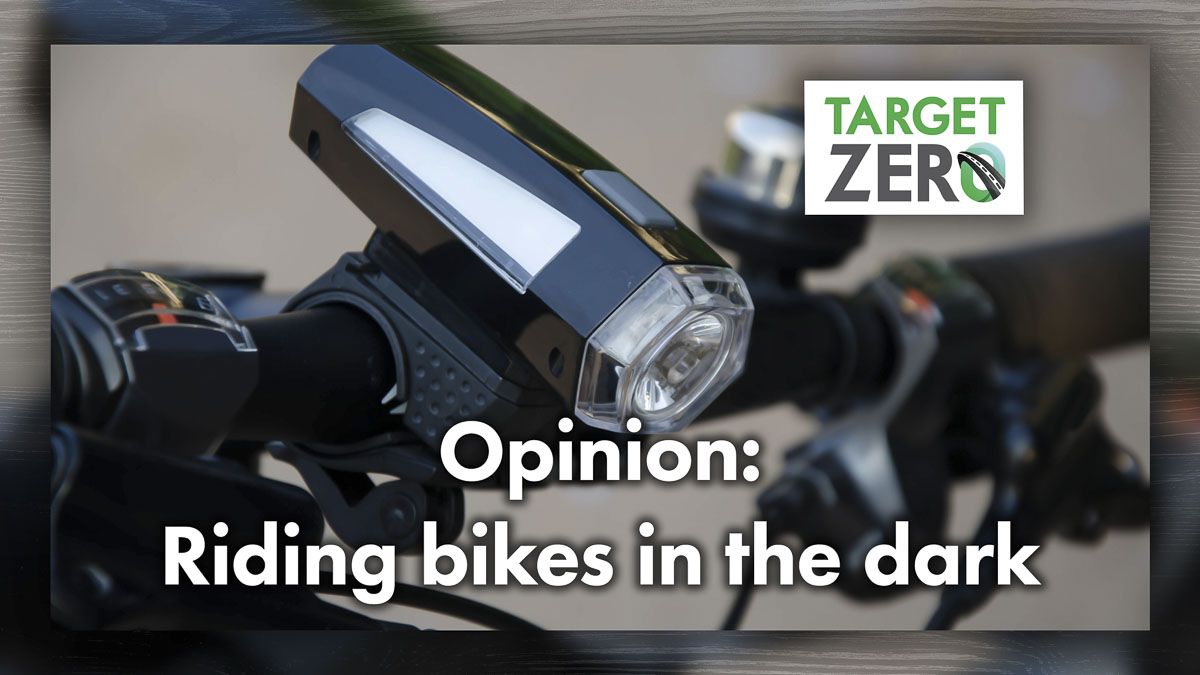
Target Zero Manager Doug Dahl addresses a question about laws regarding how to ride a bicycle at night
Doug Dahl
The Wise Drive
Q: I am fearful as a driver, especially during the short daylight time of year when I see so many bicyclists wearing dark clothing, and with no reflectors, tail lights or headlights. Are there no laws requiring lights and/or reflectors on bicycles at night and if there are, why are violators not cited by law enforcement more often?
A: Years ago I took a bike ride in a new-to-me part of our fine state. Given the route, I was sure I would get back before dark. And from this setup, you already know I didn’t. Well into the ride I came to a tee in the road that I didn’t remember on the map. To the left was a sign that read, “Watch for bears,” so I went right, and ended up going miles in the wrong direction. By the time I got reoriented I knew I’d be ending this ride in the dark. And as a committed daytime-only rider, I didn’t have lights on my bike.

The fear you (and many of us drivers) have about unlit cyclists at night does not compare to how I felt knowing I was nearly invisible on a rural, unlit road. I ended up walking a good stretch while using the flashlight on my phone so drivers could see me. This was years ago, and I still remember the happy feeling of reaching a road with streetlights and a sidewalk.
It was that fear, and not the law, that prompted me to equip my bike with lights. But there is a law. When riding “during the hours of darkness” bikes need a headlight, visible for at least 500 feet, and a red rear reflector, visible for at least 600 feet. In addition to the rear reflector, cyclists can also add a steady or flashing red rear light.
Why don’t cyclists always have lights and reflectors? It could be inexperience. I didn’t think I’d need a light on my bike, until I did. But also, people ride bikes for a lot of reasons; fun, exercise, mental health, convenience, reducing your carbon footprint, it’s cheaper than owning a car. There’s also a subset of bike riders that are on a bike because they lost their privilege to drive. The same folks that were making poor driving decisions are now making poor biking decisions.
Yes, cyclists need to follow the law. At the same time, us drivers are the ones with a license, which implies both adequate knowledge and an understanding of the responsibility involved in piloting a multi-ton projectile. A cyclist’s ignorance, or even disregard, of the risks can put them in a dangerous situation, but the damage comes from the 6000-pound SUV that they collide with. I’m not trying to place or shift blame; this is just a reminder that it takes all of us to make our roads safer.
As to why bike light laws aren’t enforced more, I can’t speak on behalf of law enforcement agencies. However, if I were in charge of prioritizing traffic enforcement in a police department, I’d want to be informed by crash data. Last year 18 cyclists were killed in crashes in Washington. Meanwhile, 141 motorcyclists, 157 pedestrians, and 493 drivers or occupants of vehicles died in crashes. The top contributing factors were impairment, speed, distraction, and lack of seatbelt use. Those aren’t just data points; they’re our friends, family, and neighbors. When an officer stops a cyclist riding at night without a light they might save a life; when a department prioritizes enforcement of the top contributing factors to fatal crashes they can save a lot of lives.

The Wise Drive is hosted by Doug Dahl, a Target Zero manager for the Washington Traffic Safety Commission.
Also read:
- POLL: Why did voters reject all three tax proposals in the April 22 special election?Clark County voters rejected all three tax measures on the April 22 special election ballot, prompting questions about trust, affordability, and communication.
- Opinion: The war on parental rightsNancy Churchill argues that Olympia lawmakers are undermining voter-approved parental rights by rewriting key legislation and silencing dissent.
- Opinion: An Earth Day Lesson – Last year’s biggest environmental victories came from free marketsTodd Myers argues that Earth Day should highlight free-market solutions and grassroots innovation as more effective tools for environmental stewardship than top-down mandates.
- Opinion: Time to limit emergency clauses and give voters a choiceTodd Myers urges the governor to remove emergency clauses from bills that appear intended to block voter input rather than address real emergencies.
- Letter: C-TRAN Board improper meeting conductCamas resident Rick Vermeers criticizes the C-TRAN Board for misusing parliamentary procedure during a controversial vote on light rail.










